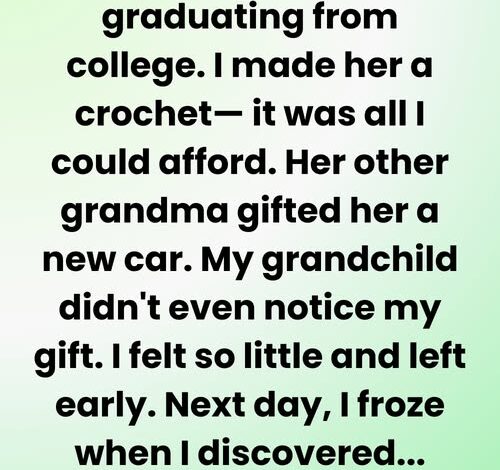
My Granddaughter Ignored My Handmade Gift—But The Next Day, I Found It In Pieces
I spent three months on that blanket. Every night after dinner, I’d curl into my chair with a basket of leftover yarn—bits from her baby sweater, the shawl I made for her mother, scraps of birthdays and winters and lullabies—and stitch them into something warm enough to say everything I couldn’t afford to buy. It wasn’t perfect. But every color had a memory, and every row had my love in it.
The graduation party sparkled—white tents, a DJ spinning ‘90s, catered everything. My daughter, Maris, had outdone herself. People laughed and posed and shouted across the lawn. Then Leilani’s other grandma, Sheryl, rolled up with a silver SUV and a bow big enough to wear as a hat. Leilani screamed, cried, hugged her. Cameras flashed. My gift bag sat quiet in my hands.
“Aw, thank you, Grandma,” she said, polite as a princess, and passed it to someone without opening it.
No one noticed me standing there with my paper plate. Not Maris, who was lost in logistics. Not Leilani, who was lost in the shine. I slipped out before dessert, my throat too tight to swallow anything sweet.
The next morning I dropped off a container of leftovers like I’d promised. The garage bin was already at the curb. I saw my wrapping paper near the top, the pattern I’d chosen because it reminded me of her nursery. Then I saw it: the blanket. Unfolded, ripped down one side, yarn pulled loose like its insides were spilling out.
I didn’t knock. I drove home with my hands shaking on the wheel and didn’t sleep that night. For days, my phone stayed quiet. I tried not to be petty, but grief and pride make sharp little knives. I raised that girl. I taught her to braid and bake, and when her seventh-grade friends turned cruel, she sobbed into my shoulder. And now a car outshone all of that? Outshone me?
On Thursday, a text: “Hey Grandma! Sorry I didn’t get to talk to you much at the party, it was super hectic. Thank you for the gift!! 💕”
I typed, “Did you like the blanket?” and watched the dots appear, then disappear. Nothing.
Two days later, Maris called like it was any Saturday. “Brunch on Sunday? Lei wants to see you.”
I should’ve said no. I went anyway.
Leilani was waiting at the door, hiding something behind her back. “I need to explain,” she said, pulling me to her room. On the bed was the blanket, or what was left of it—tangled, split, a heart unraveling.
“I didn’t throw it away,” she blurted. “I gave it to Marcus. His mom’s been freezing—the heater broke—and she has bad arthritis. He asked if I had something warm. I told him it was from you.”
I stared. “Then why was it in the trash?”
She bit her lip. “Her ex found it. He… he’s not a good man. He ripped it up. I was going to tell you. I just… didn’t know how.”
I touched the loose strands, my own stitches slipping between my fingers. She wasn’t being cruel. She was nineteen—trying to help one person, afraid to hurt another, thinking a silence could be a bandage.
“I’m not mad,” I said, surprising us both. “I wish you’d told me sooner.”
She nodded, tears hanging on her lashes. Then she stepped into me and hugged me like she used to when she was little—fierce, apologetic, real.
We ate quiet eggs and fruit and talked like equals. Later that week a handwritten note arrived, the kind of letter you keep in a drawer:
“Dear Ms. Araceli,
I don’t know you, but thank you. The blanket warmed more than my body. It made me feel seen. When my ex destroyed it, I cried—not because of the blanket, but because I lost a kindness I didn’t think I deserved.
With gratitude,
Yvonne.”
That letter broke me open and put me back together. I pulled my basket out again and started a new blanket in deep blues and soft greens—ocean calm. I mailed it to Yvonne. Two weeks later she called. We talked an hour—about pain and patterns and how arthritis steals from you slowly. She used to crochet, too. Now we have tea once a month. I show her gentle hand stretches. She brings old notebook patterns with coffee stains and little hearts in the margins. Her hands tremble, but she’s trying again.
It’s strange, the way hurt can be a doorway. Leilani and I are different now—less pedestal, more honesty. She helped pick yarn last week, thumbing through skeins like she was reading them. We’re building something new.
I used to think handmade gifts wanted applause. They don’t. They just want to be remembered. To carry a story from one warm body to another.
So if someone gives you something small and quiet—look closely. There might be a whole history stitched inside. And if you’re the giver, trust this: love lands, even if it takes a detour.




